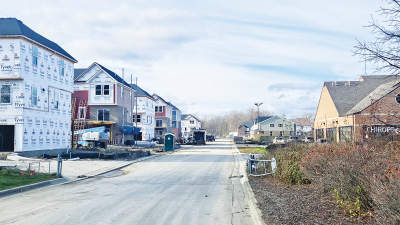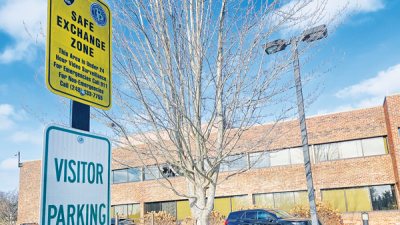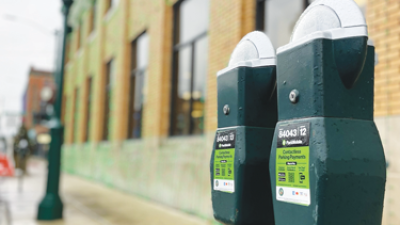BIRMINGHAM — Before the regular Birmingham City Commission meeting Feb. 13, an official City Commission workshop meeting was held to discuss current marijuana laws.
The presentation was given by City Attorney Mary Kucharek, who outlined the legal history behind marijuana, the current status of the law, and what this could potentially mean for the city.
“I don’t want to be known as a city attorney who’s trying to bring marijuana to the borders of Birmingham. That’s not what I’m trying to do. That’s not my purpose. That’s not my agenda. That’s not my job,” Kucharek said. “My purpose is to make sure this commission is fully apprised of the laws in Michigan and how they could affect the citizens, and you, as the legislative body, need to be made aware of all of those laws and potential outcomes and unintended consequences for the city.”
Kucharek walked the commissioners through basic information about the legality of marijuana on a national level. She said that marijuana is legal medically in 39 states and recreationally in 21 states, including Michigan.
Three major laws have been established in Michigan regarding marijuana since 2008.
The Michigan Medical Marihuana Act, passed in 2008, allows patients and caregivers to grow marijuana in their homes for medical use; the Medical Marihuana Facilities Licensing Act, passed in 2016, allows for the commercial sale of medical marijuana; the Michigan Regulation and Taxation of Marihuana Act, passed in 2018, legalized recreational marijuana use for anyone 21 or older to possess and grow a certain amount of marijuana.
According to the Michigan Regulation and Taxation of Marihuana Act, a marijuana establishment can be licensed as a grower, a processor, a secure transporter, a retailer, a safety compliance facility and a micro business.
The discussion Feb. 13 was mostly concerning the Michigan Regulation and Taxation of Marihuana Act, particularly the licensing of retailers and micro businesses.
Kucharek outlined what the Michigan Regulation and Taxation of Marihuana Act means for municipalities. According to this act, a municipality can permit or limit the number of marijuana establishments within its boundaries.
When the proposal to legalize marijuana appeared on statewide ballots in 2018, 7,296 Birmingham voters said yes to the proposal and 4,721 turned it down.
However, the Birmingham City Commission passed a resolution to opt out of having marijuana establishments within the city’s jurisdiction in 2018.
Some of the local municipalities that have opted-in include Detroit, Ann Arbor, Royal Oak, Ferndale, Hazel Park, Walled Lake and Lake Orion.
According to this act, residents may initiate an ordinance to be placed on the ballot that allows marijuana establishments, regardless of the commission’s decision to opt out. This ordinance proposal on the ballot may be passed by the voters.
However, if a legislative body decides to pass an ordinance, they have the control to regulate marijuana establishments through a regulatory ordinance alone or through the combination of a regulatory ordinance and a zoning ordinance amendment. This gives local control of the type of establishments, the number of establishments and the location of those establishments.
According to Kucharek’s presentation, the benefits of the city opting in include local control over the ordinance, control of marijuana within its borders, time to process and adjust to changes on its own terms and conditions, and the ability to amend the ordinance.
If Birmingham remains opted out, marijuana establishments will continue to be prohibited within the city, but there is a possibility of a citizen ballot initiative showing up on the ballot to counteract that.
There have been citizen initiative petitions in several cities in Michigan, including Allen Park, Auburn Hills, Belleville City, Royal Oak Township and more.
Kucharek ended her presentation with a recommendation.
“My recommendation is to take control of the issue. Now what does that mean? That is up for you to decide,” Kucharek said.
City Manager Tom Markus said part of the reason this was brought up was self-defense.
“We wanted to make you aware that there is a serious possibility that an initiation could occur,” Markus said during the meeting.
Following the presentation, the City Commission discussed specific topics involving zoning and regulations.
Mayor Pro-Tem Elaine McLain asked about the possibility that this conversation could encourage a citizen petition, while they are instead meaning to correctly manage their resources.
Kucharek said that this is a topic that the city already regularly receives calls about.
“To not talk about something because it might stimulate the idea in someone’s head would be naive of us, and we are just putting our heads in the sand,” Kucharek said.
There was one public comment from a Birmingham property owner opposing the opting-in of the city to allow marijuana establishments. This individual encouraged the City Commission to take a stand and do a thorough examination on how this would affect the community.
This topic may arise at future City Commission meetings. Recordings of every public meeting can be found on bhamgov.org.
 Publication select ▼
Publication select ▼





















